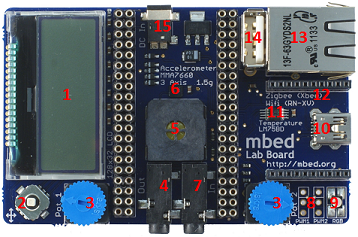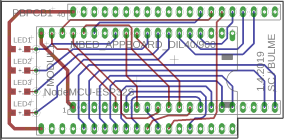Important changes to repositories hosted on mbed.com
Mbed hosted mercurial repositories are deprecated and are due to be permanently deleted in July 2026.
To keep a copy of this software download the repository Zip archive or clone locally using Mercurial.
It is also possible to export all your personal repositories from the account settings page.
You are viewing an older revision! See the latest version
ESP32 mbed Application Board
mbed Application Board Application board for ESP32 Node32s
As described in Notes the application board has been designed to enable the maximum number of potential experiments and projects, with the minimum footprint.

Although that there are 2x20 way headers for the mbed for jumper wiring pins off-board, it's a fairly well encapsulated platform.
With the addOn board the ESP32 board NodeMCU32s can be used.

Feature list¶
- 128x32 Graphics LCD
- 5 way joystick
- 2 x Potentiometers
- 3.5mm Audio jack (Analog Out)
- Speaker, PWM connected
- 3 Axis +/1 1.5g Accelerometer
- 3.5mm Audio jack (Analog In)
- 2 x Servo motor headers
- RGB LED, PWM connected
- USB-mini-B Connector
- Temperature sensor
- Socket for for Xbee (Zigbee) or RN-XV (Wifi)
- RJ45 Ethernet Connector
- USB-A Connector
- 1.3mm DC Jack input
1. 128x32 LCD¶
An Arduino ESP32 example program to print text to the LCD
mbedEsp32S_LCD_SPI_HelloWorld.ino
#include <U8g2lib.h>
U8G2_ST7565_NHD_C12832_F_4W_HW_SPI u8g2(U8G2_R2, 5, 14, 13); // rotation = 180° = U8G2_R2 // VSPImosi(GPIO23), VSPIclk(GPIO18)
char buff[20];
void setup(void) {
u8g2.begin();
}
void loop(void) {
sprintf(buff, "Hello World");
u8g2.setFont(u8g2_font_ncenB08_tr);
u8g2.drawStr(0,30,buff);
u8g2.sendBuffer();
}